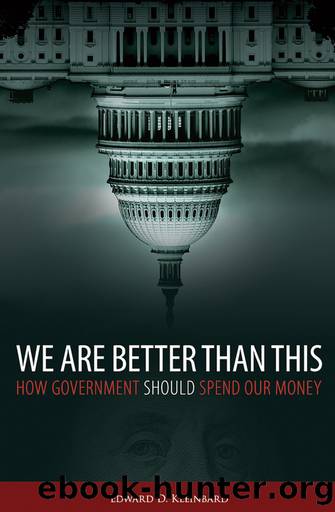We Are Better Than This by Edward D. Kleinbard

Author:Edward D. Kleinbard
Language: eng
Format: epub
Publisher: Oxford University Press
Published: 2014-06-15T00:00:00+00:00
LOW TAXES YET HIGH PAIN
Chapter 8 explained that in 2012 the United States had the lowest tax collections of any OECD country as a percentage of GDP. Yet we do not behave as if that is the case: to the contrary, all the evidence suggests that we are a nation of tax whiners. Are there reasons for this, beyond revealing an odd national personality trait, dating back to the Boston Tea Party?27
Tax expenditures are a large part of the explanation. Tax expenditures distort our understanding of the tax pain that we inflict on ourselves by reducing government tax revenues in the official scorekeeping, rather than being recorded in a manner consistent with their substance, as additional tax collections offset by government spending programs. And in turn, the United States is a tax expenditure junkie: as just explained, the United States spent more through income tax expenditures in 2012 than it collected in income tax. This means that our tax rate structure operates as if we collected more than $2 trillion in income tax, not $1 trillion, and then ran additional government spending programs that cost more than $1 trillion/year.
In other words, our low tax collections are raised through a tax rate structure whose marginal rates are appropriate to a much larger taxing function than the official scorekeeping suggests. And looking at matters from the opposite direction, if additional tax revenue is needed (and chapters 6 through 8 have already demonstrated that it is), the best way to raise that additional revenue is through âinframarginalâ tax collections, which is the economistâs way of saying that we should broaden the tax base rather than raise marginal rates. The reason, as described in chapter 2, is that marginal rates have a greater negative impact on our behaviorânot just our propensity for tax whining, but the economic choices we makeâthan do average tax rates.
Scaling back tax expenditures raises tax revenues without any need to touch statutory tax rates. Admittedly, doing so can have marginal tax implications from the perspective of effective (rather than statutory) marginal tax ratesâparticularly for the earned income tax credit, which I conceptualize more as an adjustment to the tax rate scale for low-wage labor income than a true tax expenditure. Nonetheless, the effective marginal tax rate implications of scaling back tax expenditures in practice either are more muted when some of the largest and most inefficient tax expenditures are considered, particularly the personal itemized deductions, or simply are dominated by the efficiency losses of current lawâs subsidies.
This is why every major tax reform initiative begins by proposing a vast reduction in subsidies delivered through the tax code. By doing so, either the existing rate structure can be retained, and more revenues collected, or alternatively existing revenue levels can be maintained and tax rates lowered.
Chapters 6 and 13 explain why we have no choice but to follow the first path. We are the mirror image of the fellow in the old story who complains to his doctor that his wife thinks she is a chicken.
Download
This site does not store any files on its server. We only index and link to content provided by other sites. Please contact the content providers to delete copyright contents if any and email us, we'll remove relevant links or contents immediately.
Collaborating with Parents for Early School Success : The Achieving-Behaving-Caring Program by Stephanie H. McConaughy; Pam Kay; Julie A. Welkowitz; Kim Hewitt; Martha D. Fitzgerald(896)
Entrepreneurship Education and Training: The Issue of Effectiveness by Colette Henry Frances Hill Claire Leitch(664)
Adding Value to Policy Analysis and Advice by Claudia Scott; Karen Baehler(499)
Materializing the Middle Passage by Jane Webster;(496)
Race and American Political Development by unknow(485)
Sociological Perspectives of Health and Illness by Constantinos N. Phellas(476)
American Government and Politics Today by Steffen W. Schmidt Mack C. Shelley Barbara A. Bardes(475)
Human and Global Security : An Exploration of Terms by Peter Stoett(459)
Control Of Oil - Hardback by Kayal(455)
The Disappearance of Rituals: A Topology of the Present by Byung-Chul Han(398)
Advances in Child Development and Behavior, Volume 37 by Patricia J. Bauer(395)
The Catholic Church and European State Formation, AD 1000-1500 by Jørgen Møller(388)
The World According to China by Elizabeth C. Economy(378)
Theories of Counseling and Psychotherapy: A Case Approach by Nancy L. Murdock(370)
Left Is Not Woke by Susan Neiman(366)
Application of classical statistics, logratio transformation and multifractal approaches to delineate geochemical anomalies in the Zarshuran gold district, NW Iran by unknow(362)
Turkey's Relations with the West and the Turkic Republics: The Rise and Fall of the Turkish Model by Idris Bal(352)
Cross-Cultural Child Development for Social Workers by Lena Robinson(347)
Japan's Ainu Minority in Tokyo by Mark K. Watson(330)
